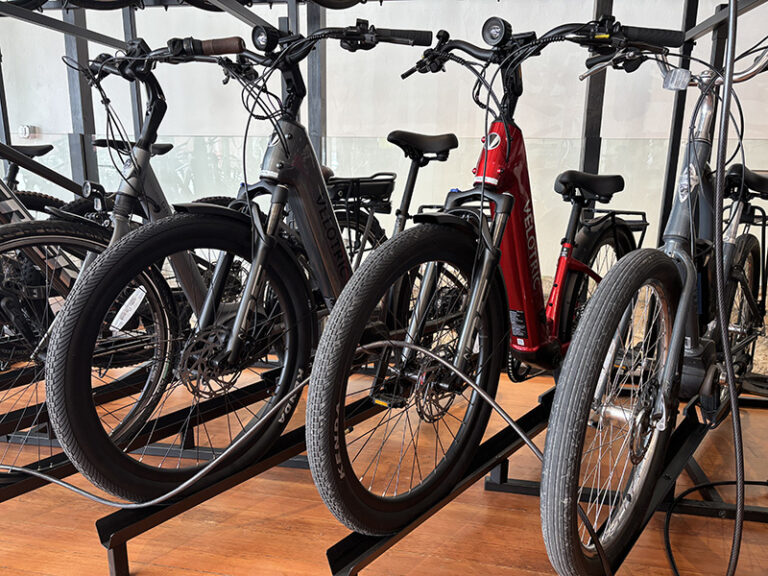Comparing Spokane’s bicycle infrastructure to that in cities which have embraced cycling can be discouraging. New York is planning for nearly 800 new miles of bikeways and lanes. Seattle has pumped $36 million into cycling infrastructure over the last four years, creating 129 miles of bike lanes and sharrows and 98 more miles of signed routes. Portland will have nearly 1,000 miles of bike infrastructure by 2030.
Spokane, however, has implemented just 24 of 85 miles of the bike lanes on the Master Bike Plan, many on roads, such as much of Fourth Avenue, which current Bicycle Advisory Board member and past-chair Wilma Flanagan described as “horrible.” Zero of nine Greenway miles on the MBP have come to fruition. No more than 10 miles of marked/shared roadways of the MBP’s 48 have been implemented. While Spokane is not, and need not aspire to be, New York, Seattle, or Portland, what those cities have that Spokane doesn’t is a sustained leadership and commitment to cycling at the city, business and citizen volunteer levels.
Barb Chamberlain, a BAB past-chair who is Executive Director of Washington Bikes, formerly the Bicycle Alliance of Washington, says that “A world-class city shouldn’t have to rely on volunteers, which is why we need both continued and growing commitment from city staff. An advocacy-focused group, such as Washington Bikes, outside the city process is also essential. Because city staff can’t advocate and a volunteer effort can only get so much done, leadership is needed from the city.”
Bob Lutz, Bloomsday Medical Director who chaired the BAB during the Hession and Verner administrations, says the mayor providing the most leadership on cycling was Mary Verner. But, Lutz says, “she surrounded herself with bad advisors, and while I believe her intentions were good, she allowed those she ‘trusted’ to advise her, and not always to her benefit.”
Despite the city’s lack of sustained leadership, progress has been made. Along with overhauling the Master Bike Plan in 2009, resulting in the recently eliminated Bicycle/Pedestrian Coordinator position and new bike lanes and sharrows, particularly downtown, the all-volunteer Bicycle Advisory Board is working with city staff to update the current MBP. BAB volunteers are also working on Spokane’s second Bicycle Friendly City application to the League of American Bicyclists. The first resulted in a bronze level bicycle friendly city designation.

Other successes include Bike to Work Week/Month and Spokefest, each of which originated with one-time BAB members. Additionally, after several years of promises, Washington Bikes has made a four-year commitment to locate a full-time staffer in Spokane. Though she expects her focus to expand as her job evolves, Spokane native Katherine Johnston will initially focus on Safe Routes to Schools and working with Spokane Regional Health District.
Flanagan is hopeful about the future. “Previously, I felt disrespected, but more city staff are attending BAB meetings and the “Commute of the Century” was a Bike to Work week event planned by city staff that included five rides that looked at infrastructure to see what works and what doesn’t. They are also providing the administrative support the law requires.”
The elimination of the Bicycle/Pedestrian Coordinator position without consulting the BAB exacerbated the feeling of disrespect. About this, Mayor Condon wrote that “The functions previously performed by [eliminated bike/ped coordinator] are being integrated into a new multifaceted transportation planning effort. This step forward for alternative forms of transportation brings them into the same process as other components of our city’s core transportation infrastructure.”
The problem, according to Lutz, is that “while this may be true to some degree, there still needs to be ‘coordination,’ that nobody is there to focus on cycling as a sole responsibility.” Flanagan says the Bike/Ped Coordinator “was put in an impossible position where no one valued his ideas or work. He was not given the clout from day one.” And while Spokane’s municipal code would indicate that the BAB should have been part of the discussion that eliminated a position they worked to develop, they were not. Lutz says the BAB will always fly under the radar as long as advisory boards have no substance.
Chamberlain and Washington Bike’s message is that “even if you never ride a bike, your town will be stronger economically if more people who want to bicycle can do so safely with complete connections to their destinations, which are the same destinations that people in cars have. Biking is good for everyone’s wallets, and that’s why we should invest in it. No ideology needed.” //













